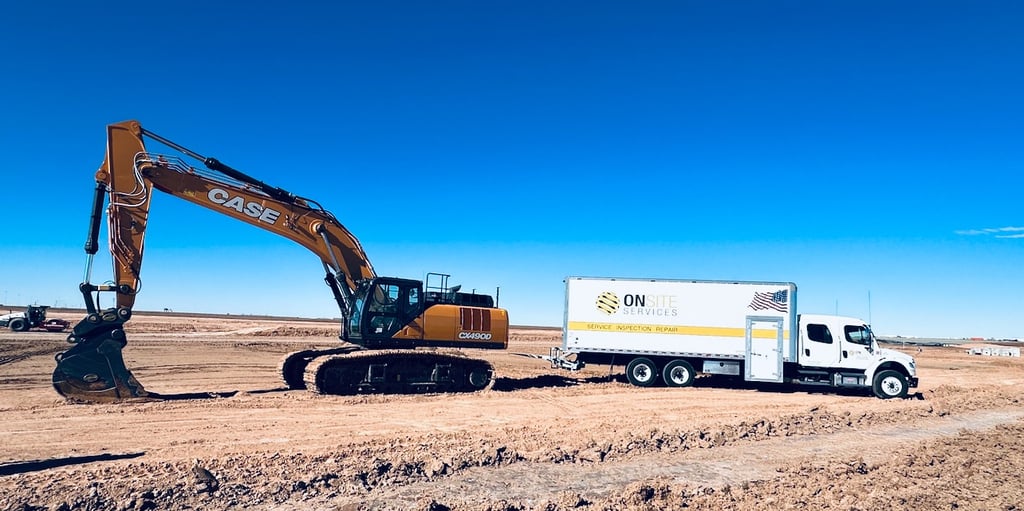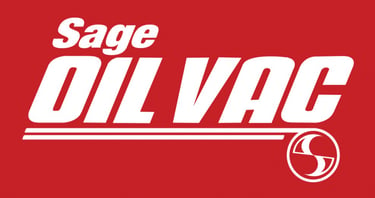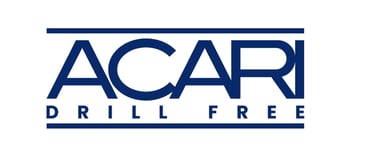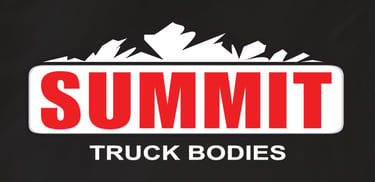~ Created by fleet pros, for fleet pros - Your voice of the Industry ~


Preventative Maintenance for Off-Highway Utility Equipment: A Field-Ready Approach
By: Jeremy Thompson
General Manager with On Site Services
In the demanding world of off-highway utility work—where bucket trucks, digger derricks, wire stringers, and increasingly specialized equipment like tracked machines and cranes operate in rugged terrain—preventative maintenance is not just a best practice; it’s a mission-critical strategy. These machines are the backbone of power line construction and maintenance, often deployed in remote areas where downtime can mean costly delays and safety risks. To keep operations running smoothly, a proactive, field-ready maintenance approach is essential.
Expanding the Fleet: Equipment Requiring Field Maintenance
Modern utility operations rely on a diverse fleet of off-highway equipment, including:
Bucket Trucks (wheeled and tracked)
Digger Derricks (wheeled and tracked)
Wire Stringers
Cranes with Off-Road Tires
Tracked Utility Vehicles
Yellow Iron (excavators, loaders, dozers, etc.)
Each of these machines has unique maintenance needs, but they all share the challenge of operating in remote, rugged environments where traditional shop service is not feasible.
The Role of Off-Road Service Trucks
To meet the demands of maintaining off-highway utility equipment in remote and rugged environments, off-road service trucks are designed to function as fully equipped mobile maintenance hubs. These trucks vary in size and capability depending on terrain and fleet needs, ranging from Class 8 box trucks for high-capacity operations to Class 6 “standardized” service trucks for nimble access in tighter or softer ground conditions.
Key features include:
Seven Oil Product Capacities: These trucks carry a range of fluids including engine oil, hydraulic oil, transmission fluid, gear oil, coolant, and specialty lubricants. This diversity ensures compatibility with everything from tracked digger derricks to yellow iron.
Waste Oil Containment Systems: Integrated tanks and spill-proof systems allow technicians to safely collect, and store used fluids for proper disposal, maintaining environmental compliance and preventing ground contamination.
Used Filter Storage: Dedicated compartments for storing used filters reduce the risk of cross-contamination and help maintain a clean work environment on the truck and job site.
New Filter Storage: Organized shelving and bins keep filters for various types of equipment readily accessible, enabling efficient service without delays.
Onboard Air and Power Systems: Many trucks are equipped with compressors, generators, and welding capabilities to support a wide range of field repairs.
Terrain-Specific Configurations:
Class 8 box trucks are ideal for well-developed access roads and larger job sites where high fluid volume and parts inventory are needed.
Class 6 service trucks offer greater maneuverability and are often used in tighter, off-road conditions such as forested areas, soft ground, or steep grades.
This mobile setup allows technicians to perform full fluid services, filter changes, minor mechanical repairs, and diagnostics directly at the job site—reducing downtime and increasing operational efficiency.
Common Maintenance Challenges
Terrain Accessibility: Even with off-road capabilities, reaching remote sites can be difficult due to mud, snow, steep inclines, or narrow paths. This can delay service and increase wear on service vehicles.
Fluid Contamination: Dust, moisture, and debris in the field can compromise hydraulic and lubrication systems if proper procedures and containment aren’t followed during service.
Inventory Management: Maintaining the correct mix of filters, fluids, and parts for a diverse fleet—including cranes, tracked vehicles, and yellow iron—requires precise planning and real-time inventory tracking.
Weather Conditions: Extreme heat, cold, rain, or lightning can halt service operations and pose risks to technicians, especially when working with pressurized systems or electrical components.
Limited Diagnostic Tools: Field conditions may restrict access to advanced diagnostic equipment, making it harder to identify complex issues without returning to a shop.
Technician Fatigue: Long hours, travel between remote sites, and physically demanding work can lead to fatigue, increasing the risk of errors or injury.
SPCC Compliance (Spill Prevention, Control, and Countermeasure): Ensuring compliance with SPCC regulations is critical when handling oil and hazardous materials in the field. Service trucks must be equipped with spill kits, containment systems, and proper documentation to prevent environmental incidents and meet federal and state requirements.
Safety Challenges in Field Maintenance
Working Around Live Lines: Requires strict lockout/tagout procedures and heightened awareness.
Remote Emergency Response: Delayed access to medical aid demands strong safety protocols.
Hazardous Material Handling: Multiple oil types and waste fluids require proper PPE and containment.
Vehicle Positioning Risks: Stabilizing service trucks and cranes on uneven terrain is critical.
Weather-Related Hazards: Lightning, heat stress, and icy conditions pose serious risks.
Fatigue and Distraction: Environmental stressors can reduce situational awareness.
Operational Benefits of Field-Ready Preventative Maintenance:
Reduced Downtime
On-site service capabilities dramatically reduce the time equipment spends out of commission. Instead of hauling machines back to a central shop or waiting for parts and fluids to arrive, technicians can perform maintenance and minor repairs directly at the job site. This keeps crews working, projects on schedule, and utility services uninterrupted—especially critical during storm response or emergency restoration efforts.
Additionally, service teams often operate on modified schedules based on customer needs, including weekends and after-hours. This flexibility ensures that maintenance can be performed during off-peak times or in coordination with operational windows, minimizing disruption to active job sites and maximizing equipment availability.
Extended Equipment Life
Most off-highway units operate in extreme duty scenarios—from tracked bucket trucks navigating swampy terrain to cranes lifting heavy loads on uneven ground. These conditions accelerate wear and tear, making preventative maintenance essential. Routine fluid changes, filter replacements, and inspections help mitigate the impact of harsh environments, preventing premature component failure. By maintaining optimal operating conditions, equipment life is extended, reducing capital expenditures and improving fleet reliability.
Improved Safety
Well-maintained equipment is far less likely to experience catastrophic failures such as hydraulic leaks, electrical shorts, or mechanical breakdowns during operation. This protects both operators and ground crews, especially when working around energized lines, elevated platforms, or unstable terrain. Regular inspections also help identify safety hazards like worn tires, cracked welds, or faulty controls before they become incidents.
Environmental Stewardship
Off-road service trucks equipped with waste oil containment and used filter storage help crews comply with environmental regulations and prevent spills in sensitive areas. Proper handling of fluids and filters ensures that contaminants don’t enter soil or water systems. Additionally, SPCC-compliant setups and spill kits support responsible field operations, reinforcing the company’s commitment to sustainability and regulatory compliance.
Conclusion
Preventative maintenance for off-highway utility equipment—including tracked machines, cranes, and yellow iron—is a strategic investment in reliability, safety, and efficiency. With the right off-road service truck setup—complete with multi-fluid capacity, waste management, and filter storage—utility teams can maintain peak performance in even the most challenging environments. Addressing common maintenance and safety challenges head-on ensures that the mission continues, no matter where the line leads.
Jeremy's Bio:
Originally from Grangeville, Idaho, I bring over 20 years of experience in heavy equipment, fleet service, and industrial maintenance.
I’m proud to be the first employee hired by On‑Site Services back in 2010, working side-by-side with our founder to build a service-first, solutions-driven company. My journey started in the U.S. Marine Corps as an M1A1 tank mechanic, followed by time in the field leading equipment companies, where I honed my skills in mechanical systems, diagnostics, and customer-focused service. Now, I live in Godley, Texas as the general manager for On-Site Services out of Fort Worth.
At On‑Site Services, I’ve helped shape a culture defined by urgency, teamwork, and accountability—what we call the "pit-crew mentality." I believe great leadership starts with doing the work, training the next generation, and being willing to get your hands dirty. Whether I’m streamlining operational workflows, or mentoring our techs, I’m focused on one thing: Keeping America Working.
Contact me here: www.linkedin.com/jeremy-thompson
#FleetMaintenance #PreventativeMaintenance #UtilityFleet #OffHighwayEquipment #FleetManagement #UtilityIndustry #FieldService #ServiceTrucks #MobileMaintenance #FleetOperations #HeavyEquipment #YellowIron #BucketTrucks #DiggerDerricks #TrackedVehicles #Cranes #PowerLineConstruction #UtilityContractors #EquipmentReliability #OperationalEfficiency #FleetSafety #EnvironmentalCompliance #SPCC #FleetLifecycle #TruckTalkU


Connect with us!
info@trucktalku.com
P: 817-875-3695
© 2025. All rights reserved.
T
We proudly endorse our great business partners!






